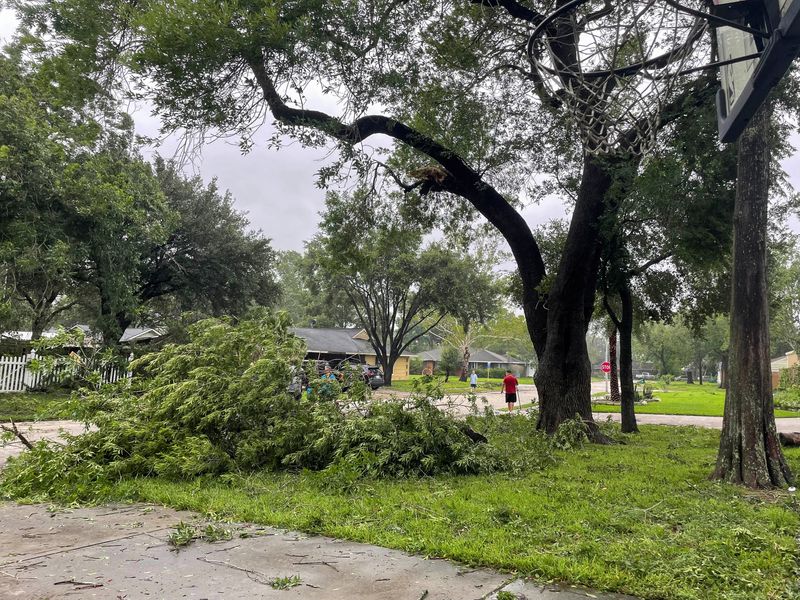By Arathy Somasekhar, Georgina McCartney and Laila Kearney
HOUSTON (Reuters) -Oil and gas companies in Texas restarted some operations on Tuesday after Hurricane Beryl lashed the state with 80-mph (129-kph) winds, while some facilities sustained damage and power had not been fully restored.
Beryl’s impact on oil and gas production was expected to be limited. The storm made landfall on Monday near the coastal town of Matagorda. Energy firms shut operations ahead of its arrival and Texas’ largest ports and navigation channels closed.
On Tuesday, some ports reopened and most producers and facilities were ramping up output. Some were limited by the slow restoration of power to homes, businesses and industrial customers.
Weather forecasting firm AccuWeather issued a preliminary estimate of $28 billion to $32 billion in total damage and economic loss from the hurricane in the U.S.
About 2 million customers remained without power in Texas and 12,000 more in Louisiana on Tuesday, according to PowerOutage.us, including some 1.5 million served by provider CenterPoint Energy (NYSE:).
The Texas figure was more than double the number of customers that lost power in May during a weather event in Houston. It took more than a week for those outages to be resolved in some city neighborhoods.
CenterPoint said it had restored power to more than 800,000 customers, and expects to reach 1 million customers re-connected by the end of Wednesday, of the 2.26 million impacted.
“I can’t give you a timeline, but it’s not going to be tomorrow,” Centerpoint ‘s Local Government Relation manager Paul Lock, replied to a question on when power would be fully back during a press conference.
Texas Lieutenant Governor Dan Patrick urged CenterPoint to work as quickly as it can to restore power.
“We can do a post-analysis of their success or failures after we get the power back,” Patrick added in response to questions about whether the power company was prepared in advance of the hurricane.
Houston was sunny on Tuesday with temperatures in the high 90 degrees Fahrenheit (32.2° degrees Celsius), causing problems as power outages knocked out air conditioning. Many gasoline stations in Houston were closed due to lack of power or fuel stocks.
Beryl lost strength quickly upon making landfall and by Tuesday was downgraded to a post-tropical cyclone, the U.S. National Hurricane Center said. It warned that flash flooding and tornados remained possible from mid-Mississippi to the Lower Ohio Valley.
TEXAS FLOODING EASING
Texas is the largest U.S. oil and gas producing state, accounting for some 40% of oil and 20% of gas output, and is also a major shipping and refining hub. Any weather-related interruption could affect crude and fuel production levels, as well as imports and exports.
“Although the hurricane did not cause severe disruptions in U.S. oil production and refining so far, several oil ports remain closed, while vast power outages can weigh on oil demand,” Goldman Sachs said in a note.
Most refineries in Houston and Texas City are designed to maintain operations even amid heavy rainfall, but some of those facilities, ports and other energy infrastructure can develop problems from sustained power interruptions, experts said.
Marathon Petroleum Corp (NYSE:) was preparing on Monday to restart multiple units at its 631,000-barrel-per-day (bpd) Galveston Bay oil refinery in Texas City, sources said. The plant was awaiting power to restart operations, the company said in a state regulatory filing.
Phillips 66 (NYSE:)’s 265,000-bpd Sweeny refinery in Texas returned plants to normal operations after an upset on Monday caused by Beryl. Citgo Petroleum temporarily reduced production over the weekend at its 165,000-bpd Corpus Christi plant.
Ports from Point Comfort through Houston, including Freeport, Galveston, and Texas City, saw damage along with substantial operational delays, a shipping agency wrote in a note to clients.
The Port of Corpus Christi reopened ship navigation on Monday. The Port of Freeport said it reopened on Monday, adding that some facilities were running on backup power while utility crews worked to restore electricity.
The Houston Ship Channel opened to inbound traffic with restrictions, a notice from the shipping agent said. Port Houston said its terminals would be resuming operations on Wednesday.
Vessel and cargo operations at the Port of Galveston, about 50 miles (80 km) from Houston, remained suspended on Tuesday as power outages continued in parts of the city, said Rodger Rees, CEO of maritime commercial center Galveston Wharves.
At least one cruise ship was cleared to dock at Galveston on Tuesday.
Shell (LON:), Chevron (NYSE:) and BP (NYSE:) started redeploying personnel who had been evacuated from their Gulf of Mexico platforms. Exxon Mobil (NYSE:) was assessing its Hoover offshore platform, while working to restart operations, it said.
Freeport LNG, the third-largest liquefied facility in the U.S., has not provided an operational update since it said it reduced production on Sunday.

Enterprise Products Partners (NYSE:)’ unit tripped due to the weather at its natural gas liquids (NGL) processing facility in Mont Belvieu, in east Texas, according to a filing.
Energy Transfer (NYSE:)’s Mont Belvieu NGL facility was fully operational on Tuesday, the company said, following issues reported in a regulatory filing. Mont Belvieu is the pricing point for North American NGL markets.

